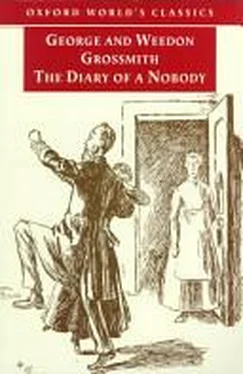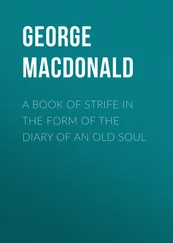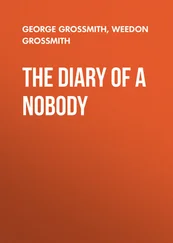George Grossmith - The Diary of a Nobody
Здесь есть возможность читать онлайн «George Grossmith - The Diary of a Nobody» весь текст электронной книги совершенно бесплатно (целиком полную версию без сокращений). В некоторых случаях можно слушать аудио, скачать через торрент в формате fb2 и присутствует краткое содержание. Жанр: Классическая проза, на английском языке. Описание произведения, (предисловие) а так же отзывы посетителей доступны на портале библиотеки ЛибКат.
- Название:The Diary of a Nobody
- Автор:
- Жанр:
- Год:неизвестен
- ISBN:нет данных
- Рейтинг книги:5 / 5. Голосов: 1
-
Избранное:Добавить в избранное
- Отзывы:
-
Ваша оценка:
- 100
- 1
- 2
- 3
- 4
- 5
The Diary of a Nobody: краткое содержание, описание и аннотация
Предлагаем к чтению аннотацию, описание, краткое содержание или предисловие (зависит от того, что написал сам автор книги «The Diary of a Nobody»). Если вы не нашли необходимую информацию о книге — напишите в комментариях, мы постараемся отыскать её.
The Diary of a Nobody — читать онлайн бесплатно полную книгу (весь текст) целиком
Ниже представлен текст книги, разбитый по страницам. Система сохранения места последней прочитанной страницы, позволяет с удобством читать онлайн бесплатно книгу «The Diary of a Nobody», без необходимости каждый раз заново искать на чём Вы остановились. Поставьте закладку, и сможете в любой момент перейти на страницу, на которой закончили чтение.
Интервал:
Закладка:
By the time of Joe Orton’s mid-1960s journal, significantly entitled Diary of a Somebody , Holloway, in one of its few literary mentions, is merely the setting for the dark public toilets where Orton indulges in homosexual encounters. Shortly before Orton wrote his diary, in 1959, Punch published some joke predictions. The most ridiculous was thought to be the one that suggested that the middle classes would move to Islington, the borough which includes Holloway. Punch was slightly wrong. Following the arrival of the fast Victoria Line tube in the late 1960s the middle classes did recolonize Islington but they went for nearby Barnsbury, Canonbury or Highbury Hill, not Holloway, which remains ungentrified. So Lupin Pooter is probably right; Holloway is still ‘a bit off’.
A Note on the Text
Punch instalments of The Diary of a Nobody appeared on 26 May 1888; 2, 9, 16, 23 June; 7, 14, 21, 28 July; 18, 25 August; and 1, 15 September. The Diary was then rested until mid November, hence the gap in Pooter’s entries and his outburst for his 30 October entry: ‘I should very much like to know who has wilfully torn the last five or six weeks out of my diary.’ Instalments continued after the break on 17, 24 November; 1, 15, 29 December; 12, 26 January 1889; 2, 9 February; 2, 30 March; and 4, 11 May.
The text of the book version of The Diary of a Nobody closely follows the Punch original but there are some differences. The Punch instalments began with the preface: ‘As everybody who is anybody is publishing reminiscences, diaries, notes, autobiographies and recollections we are sincerely grateful to A Nobody for permitting us to add to the historical collection.’ The book replaces this with the paragraph beginning ‘Why should I not publish my diary?’
The magazine’s opening instalment and the book’s first chapter both open with the Pooters moving into their new home in Holloway. The first Punch instalment ends with Pooter ordering fresh eggs (7 April) and so the book’s 8 April entry, with the Curate catching his foot in the scraper, is new. Punch ’s second instalment neatly coincides with the second chapter of the book but the link between magazine instalment and book chapter breaks down soon after.
Scenes added for the book which didn’t appear in the original include the one in which Pooter’s tie falls into the pit at the Tank Theatre (23 April), and much of the Mansion House Ball scene (7 May). The Punch original ended with Farmerson saying to Pooter: ‘Pardon me, Mr Pooter, no shop when we’re in company, please.’ So, the sheriff’s reunion with Farmerson, Pooter’s snobbish reaction to it and Pooter’s slipping over during the dance were freshly written for the book. The whole of the book’s Chapter XI – Burwin-Fosselton, Padge and the Henry Irving impersonations – were new. There were also some minor changes of date for the book, sorting out mistakes in the calendar made in the Punch original.
The main change though comes at the end of the book. The Punch episodes ended with the 21 March entry, ‘Today I shall conclude my diary…’ in which Lupin is taken on at Perkupp’s firm. In book form, however, there are seven new chapters following this Punch ending. Lupin’s position at Perkupp’s doesn’t work out, he gets a new, better paid job and gets engaged to Miss Posh. Pooter’s promise to conclude the Diary back in March now looks very odd, not that this hiccup detracts from the qualities of the Diary or the clever new ending in which Pooter again finds happiness.
Further Reading
Faber & Faber Book of Diaries , edited by Simon Brett (London: Faber & Faber, 1987). An unintentionally funny compendium of diaries by people from all backgrounds – the famous through to the ‘nobodies’ – including Samuel Pepys, John Evelyn, the Revd James Woodforde et al, and presented on a day-by-day basis. Many entries are so Pooterish they could have been out-takes from The Diary of a Nobody .
Tony Joseph, George Grossmith, Biography of a Savoyard (Bristol: Tony Joseph, 1982). Not a heavyweight biography, but suitable enough for its subject although more useful for Gilbert & Sullivan historians than Diary of a Nobody lovers.
J. B. Priestley, English Humour (London: Heinemann, 1976). A readable and lucid commentary on English humour throughout the ages with an extract from The Diary of a Nobody .
David Thorns, Suburbia (London: Paladin, 1972). One of many good accounts of how the strange English landscape called suburbia arose, particularly during Victorian times.
Keith Waterhouse, The Collected Letters of a Nobody (London: Michael Joseph, 1986). In The Diary of a Nobody Pooter alludes to writing some twenty letters, none of which we see. Waterhouse takes this as his cue and writes these letters as Pooter may have done. He also creates many more, corresponding with the manager of the local railway line about the excessive number of trains passing by that aren’t listed in Bradshaw’s timetable, to Jerome K. Jerome urging him not to publish an account of a boating holiday, to a variety of tradesmen, neighbours, Cummings and Gowing, and of course to the editor of the Blackfriars Bi-Weekly News complaining about the misspelling of his name. The funniest are those involving Lupin. At one stage Waterhouse’s Pooter writes to a Dr Hector M’Gallum at Freshfields Asylum for Idiots & Imbeciles ‘on behalf of a friend’ who has a ‘highly-strung’ son: ‘Is there any pill… that may be obtained which could be given to the boy to quieten him down?’
——, Mrs. Pooter’s Diary (London: Michael Joseph, 1983). Waterhouse believes we know too little about Carrie – what she thinks of her husband, his awkwardness, bad jokes, dead-end job, lack of ambition and incorrigible friends. What does she do all day while he’s at the office? In Waterhouse’s ingenious book she keeps a diary based largely on plot lines hinted at but not followed through in The Diary of a Nobody .
THE DIARY OF A NOBODYoriginally appeared in Punch , and is re-published by permission of the publishers, Messrs Bradbury and Agnew. The Diary has been since considerably added to. The excellent title was suggested by our mutual friend
The Diary Of Nobody
F. C. BURNAND,
to whom we have the great pleasure of dedicating this volume.
GEORGE GROSSMITH WEEDON GROSSMITH London, June, 1892 .Why should I not publish my diary? I have often seen reminiscences of people I have never even heard of, and I fail to see – because I do not happen to be a ‘Somebody’ – why my diary should not be interesting. My only regret is that I did not commence it when I was a youth.
CHARLES POOTERThe Laurels, Brickfield Terrace, Holloway .
We settle down in our new home, and I resolve to keep a diary. Tradesmen trouble us a bit, so does the scraper. The curate calls and pays me a great compliment .
Chapter I
My dear wife Carrie and I have just been a week in our new house, ‘The Laurels’, Brickfield Terrace, Holloway – a nice six-roomed residence, not counting basement, with a front breakfast-parlour. We have a little front garden; and there is a flight of ten steps up to the front door, which, by-the-by, we keep locked with the chain up. Cummings, Gowing, and our other intimate friends always come to the little side entrance, which saves the servant the trouble of going up to the front door, thereby taking her from her work. We have a nice little back garden which runs down to the railway. 29 29 which runs down to the railway : Which railway line lies at the bottom of the Pooters’ garden? As there would have been no terrace of houses by the main King’s Cross line which runs through southern Holloway it is far more likely that the Laurels is situated alongside the Tottenham and Hampstead Junction spur of the North London Line in Upper Holloway. This spur is barely used now and even then was far from rich in passenger traffic. But it has always been used for freight, especially after dark, which must have caused the Pooters a few sleepless nights, although only Lupin (in Chapter VI) admits as much. Ironically, Pooter could have taken a property only half a mile away in Drayton Park for a similar rent, without any loss of social standing and lived by a railway line which would have afforded him a quicker connection to the City than the horse-drawn omnibus he takes daily. Only a Pooter would be so badly prepared in choosing a new address.
We were rather afraid of the noise of the trains at first, but the landlord said we should not notice them after a bit, and took £2 off the rent. 30 30 and took £2 off the rent : The Pooters are happy to rent. The idea of owning one’s own home did not apply so widely then. See Jenni Calder, The Victorian Home (London: Batsford, 1977). Nor was renting confined to the lower-middle classes. Charles Dickens, for instance, rented nearly all his London addresses.
He was certainly right; and beyond the cracking of the garden wall at the bottom, we have suffered no inconvenience.
Интервал:
Закладка:
Похожие книги на «The Diary of a Nobody»
Представляем Вашему вниманию похожие книги на «The Diary of a Nobody» списком для выбора. Мы отобрали схожую по названию и смыслу литературу в надежде предоставить читателям больше вариантов отыскать новые, интересные, ещё непрочитанные произведения.
Обсуждение, отзывы о книге «The Diary of a Nobody» и просто собственные мнения читателей. Оставьте ваши комментарии, напишите, что Вы думаете о произведении, его смысле или главных героях. Укажите что конкретно понравилось, а что нет, и почему Вы так считаете.












